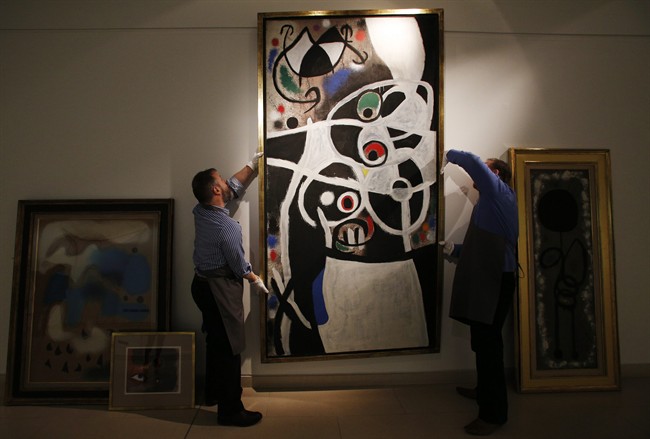LISBON, Portugal – Cash-strapped Portugal’s attempt to raise money by selling a prized Joan Miro art collection has fallen foul of a late legal wrangle as startling as one of the Spanish artist’s works.

In an unexpected twist to the Portuguese government’s troubled efforts to offload the collection, Christie’s cancelled the Miro auction in the tony St. James’s district of London a few hours before it was due to start Tuesday. The 85 works by the surrealist master were among the highlights of its two-day auction of Impressionist and modern art.
Christie’s cited legal concerns after a Lisbon court challenge to the sale earlier in the day.
In that ruling, a Lisbon judge denied a request from Portugal’s main opposition Socialist Party for an injunction to stop the sale of the works. The centre-left party’s lawmakers argued that the collection was public property because it came from a nationalized bank and should be put on display in Portugal.
But though the judge said the sale could go ahead, Christie’s said in a statement that the court challenge created “legal uncertainties” around the auction that could raise questions about future ownership rights.

Get weekly money news
The Portuguese government hoped the sale could help taxpayers recoup some of the millions they lost rescuing Banco Portugues de Negocios in 2008. The auction was expected to raise at least 36 million euros ($48 million).
Portugal’s secretary of state for culture, Jorge Barreto Xavier, said the government is required to contain spending in return for a 78 billion euro ($105 billion) international bailout it received in 2011 that spared Portugal from bankruptcy.
Keeping the collection and putting it on display would force the government to save money elsewhere, such as in the already-squeezed education or health budgets, he said.
“If we want to hold onto these works, we will have to find money for them from somewhere,” Barreto Xavier told reporters. He said the government would now consider its next steps.
Miro was a senior figure in the surrealist movement in the 1920s and went on to establish himself as a sculptor and ceramicist during a seven-decade career. He is credited with influencing a generation of abstract expressionists, including American artist Jackson Pollock.
Christie’s described the Portuguese collection as “one of the most extensive and impressive offerings of works by the artist ever to come to auction.”
Other countries have offloaded their failed banks’ art. The collapse of Lehman Brothers, the Bank of Ireland and South Korean savings banks have brought works by big-name artists to the market in recent years.
Like elsewhere, though, the Portuguese auction will barely make a dent in money owed: the collapse of Banco Portugues de Negocios left taxpayers at least 3.4 billion euros out of pocket. The nationalization of its assets, including the art works, brought it under public ownership.
The proposed sell-off hit a nerve with many Portuguese, with an online petition against the auction drawing more than 9,000 signatures.
Holding onto publicly-owned art despite financial pressures also has found support in the United States. A recent proposal to restructure Detroit’s debt included millions of dollars promised by foundations, the state and the Detroit Institute of Arts to prevent any possible sale of city-owned pieces in the museum to bolster at-risk pensions.







Comments